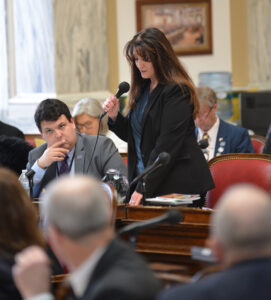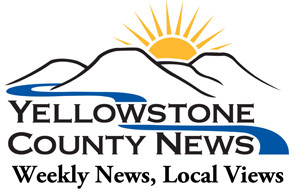by Michael J. Marino
The 68th Montana Legislature is now officially past the halfway mark in the race that is called lawmaking. With a staggering 1,413 bills introduced this year, readers may be wondering what has become of all the bills featured in the Yellowstone County News since Jan. 2.
Read on and wonder no more!

Rep. Jodee Etchart (R-Billings) is pictured here speaking during a floor session of the Montana House of Representatives. Rep. Etchart sponsored House Bill 111 to make it easier for citizens to get a public defender, which was signed into law by the Governor recently. (Jonathan McNiven photo)
*House Bill (HB) 111, a bill to make it easier for Montanans to get a public defender when involved with a case in state courts, heard its first hearing on Jan. 9 and no opposition was heard. The bill, sponsored by Jodee Etchart (R-Billings), was signed into law by Governor Greg Gianforte on March 2, after sailing through both houses with unanimous ‘yes’ votes each time.
*Senate Bill (SB) 195 came on the heels of a controversy in Billings over the City ordering Family Promise of Yellowstone Valley to stop temporarily housing homeless families in churches due to purported fire code violations. SB 195 seeks to “allow a place of religious worship to use its building space for temporary overnight visitors,” under state law, effectively prohibiting local governments from making rules regarding the former. The bill was transmitted to the House of Representatives on Feb. 2.
*SB 99. Plagued by controversy and heated opinions from both sides, this bill sponsored by Republican John Fuller of Kalispell intended to restrict children in Montana from receiving gender affirming healthcare. Entitled the “Youth Health Protection Act,” SB 99 drew a crowd of 137 people to the Capitol on Jan. 27 to testify as to why they either support or oppose it. Despite receiving 92 sets of opponent testimony and only 45 supporting, the Republican supermajority was quick to pass the bill through its required floor sessions, and by Feb. 9, it was transmitted to the House of Representatives where it remains as of press time.
*SB 320 would require Montana landlords to refund application fees to potential tenants, if that potential tenant “does not become a party to a signed rental agreement for the residential premises” the applied for. It does allow landlords to retain up to $25 of a fee for “certain expenses,” but requires the prospective tenant be notified in writing prior to the expense being incurred. SB 320 passed all three readings in Senate floor sessions and was transmitted to the House on Feb. 28.
*SB 160 sought to create a $50,000 reward for anyone “who furnishes information to law enforcement leading to a conviction for,” drug and human-trafficking related crimes. As the bill’s sponsor, Sen. Brad Molnar (R-Laurel) described, the first hearing on Jan. 18 went “splat!” No one spoke in support of the bill; however, several opponents voiced their concerns about potential “unintended consequences,” as well as the sheer expense if $50,000 was on the table for every instance of conviction-causing information being provided.
As of Jan. 31, SB 160 passed a second reading with amendments, but was again tabled in committee on Feb. 9. A revised fiscal note is the last action indicated for the bill on Feb. 28.
*SB 121 written by Republican Sen. Becky Beard aimed to “reduce the top marginal income tax rate in Montana,” and “increase the Earned Income Tax Credit (EITC)… from 3% to 10%.” On the floor of the Senate, lawmakers passed SB 121 by a vote of 68-32 on Feb. 28. No further information was available as of press time.
*SB 105, sponsored by Steve Fitzpatrick (R-Great Falls) sought to prohibit local government bodies from enacting rent control ordinances for private property. The Senate Business and Labor Committee held a hearing Jan. 10 in which a fairly even split of positive and negative feedback was voiced for the bill. It passed all three floor readings and was transmitted to the House on Jan. 31.
*HB 454 is to establish a tax on the production of renewable energy resources in Montana, sponsored by Colstrip Republican Rep. Gary Parry, who said the reason for the bill is partly to “ensure the citizens of Montana reap some of the benefits of out-of-state [energy] companies… exploiting our resources.” Several lobbyists spoke against the bill, but there was no testimony otherwise. The House Taxation Committee voted 20-1 on Feb. 23 to table the bill until a revised fiscal note was completed. Such note was printed Feb. 27.

